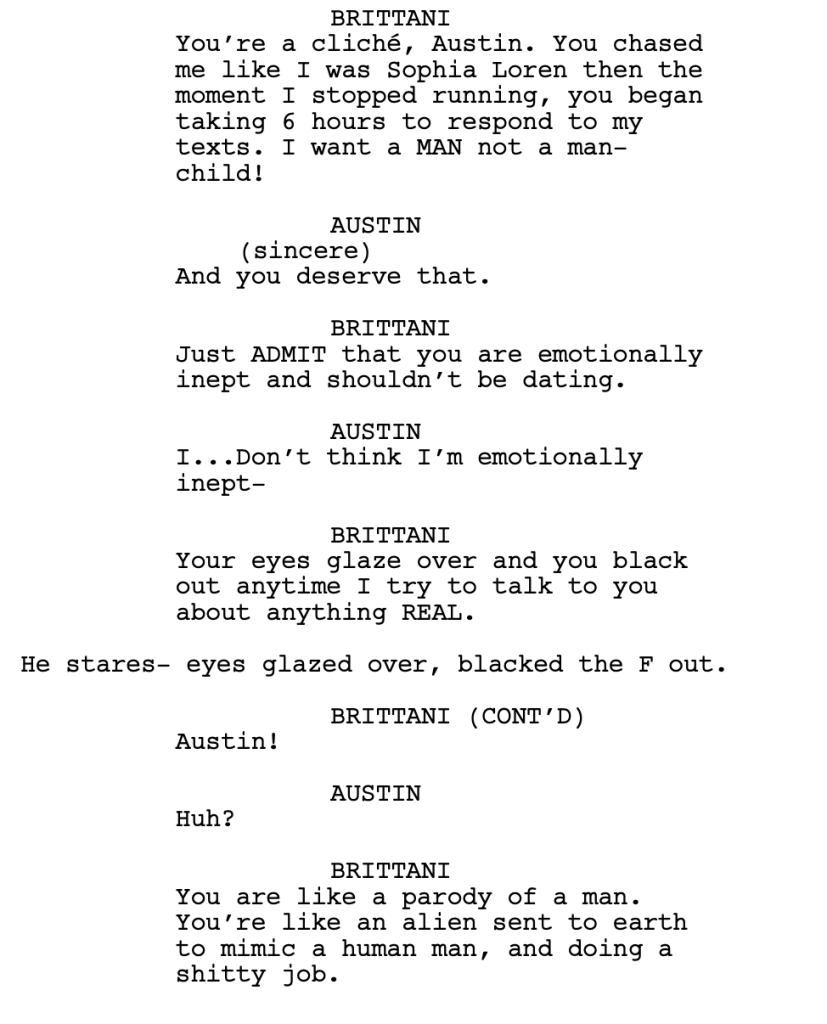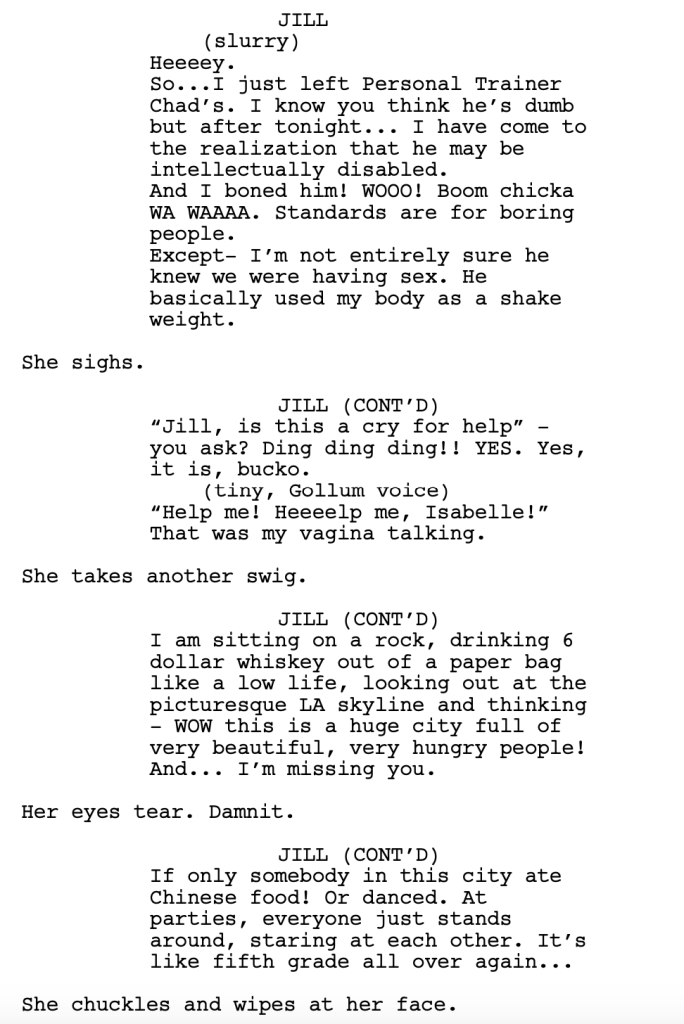Check out my interview with writer Leah McKendrick here!
Genre: Rom-Com
Premise: (from Black List) A low-level TV writer struggles to cope with the death of her little sister by continuing to leave her voicemails chronicling the shitshow that is dating in LA. When the phone number is unknowingly transferred, a cocky New York real estate agent begins receiving the hilarious and confessional voicemails, and feels pulled to California to find this stranger he feels intimately close to.
About: This spec script squeezed onto last year’s Black List with six votes. It’s become a hot project over at Sony, which preemptively purchased the script. They’ve added Hailee Steinfeld to play the lead and Sharon Maquire (Bridget Jones) to direct. Leah McKendrick is an actress and writer. She appeared in Bad Moms and she’s writing the upcoming Grease prequel.
Writer: Leah Mckendrick
Details: 117 pages
When you look through all the remaining 2019 scripts (that I haven’t read), Voicemails for Isabelle is the best concept left. And it has some high-level talent attached to it. The director of the Bridget Jones movie is helming. Hailee Steinfeld is playing the lead. That’s better than what I usually see with Black List scripts, which often don’t have anyone attached. Will this be good? If so, I promise to leave a voicemail to the writer.
Jill and her sister, Isabelle’s, relationship has always been wonderful except for one thing – Isabelle has cystic fibrosis. But she’s a fighter and she fights her way through elementary school, through high school, through Jill’s college, and even through the first part of Jill’s adult life.
But when Jill turns 29, her sister finally dies, and all of a sudden everything in the world is pointless. After the funeral, Jill heads back to LA, where she’s chasing her dream of becoming a TV writer and trying to find a boyfriend 4 life. That’s where the comedy begins. Because every man Jill runs into is a disaster.
So Jill uses her sister’s old voicemail account to leave her LA writer dream dating disaster life play-by-play. It’s the perfect coping mechanism. It allows her to still connect with her sister as well as get out all of her frustration of trying to make it in this city.
What Jill doesn’t know is that Isabelle’s number gets changed and that a real estate agent back in New York named Austin is now receiving the voicemails. At first he finds them funny. But then he starts getting invested in all the stories, particularly the latest one, where Jill thinks she’s found the love of her life in British dating coach, Chad.
But when Chad ghosts Jill, she decides to confront him at one of his book readings. And since Jill told “Isabelle” about this, Austin knows where she’s going to be. So he flies to LA to meet Jill under false pretenses, telling her “that was amazing!” after she tells off Chad, and the two start dating.
But this puts Austin in an awkward place. He now has insight into his relationship situation with Jill because she’s now talking about HIM to her sister. Unfortunately, this doesn’t help matters because Jill is super duper in love with Austin and that scares him off. Will he get over this fear? Will he tell Jill the truth about the voicemails? We’ll have to find out when the movie’s made!
Wow.
This was… unexpected.
Like unexpectedly awesome!
And not just normal awesome. Really awesome.
Let’s figure out why it worked because ideas like this have huge cringe-potential so if you don’t have a strong voice and a solid plan, they can fly south quickly. I know because I’ve read all those fly-south-for-the-winter screenplays.
For starters, it gets off on the right foot. If you’re going to deal with a horrible disease, it’s hard to do so when you lean into the sadness and depression of it. Yes, that tends to be more authentic. But it doesn’t go over well in movies. In movies, cancer (or in this case, cystic fibrosis) plays better when you go against the expectation. “Voicemails” gives us that. All mentions of the sister’s disease are placed within humorous or “humorous-adjacent” situations.
That immediately got rid of my worry that this was going to be a Depression Fest.
You know something’s working when, even though you know the death is coming, you still tear up. This had me before we even got to the second act.
The other big gold star goes to the dialogue. This writer is really good with dialogue. I get dinged a lot because I don’t talk about dialogue much in my reviews. But that’s because I only notice dialogue when it’s really good or really bad. And with the large majority of scripts, it’s somewhere in between.
But McKendrick has that extra something special in her dialogue. She knows exactly how to use humor to defuse moments that get too serious or too sad. Her timing in that area is impeccable. Combine that with a clear knowledge of the subject matter and a lot of specific detail in the dialogue – not to mention she’s been blessed with a movie-perfect sensibility for humor – and you get this script.
Here’s an early exchange.
And here’s one of her voicemails.
If you’re a writer who wants to know exactly what Hollywood is looking for in their theatrical release comedy or romantic comedy departments, read this script. This shows you where the bar is. The dialogue here is so solid throughout. Hats off to McKendrick.
There were also a lot of little impressive things about the script. For example, it has this great underlining angle of dramatic irony in that we know Austin is receiving the voicemails but our protagonist does not. This makes his courting of her that much more interesting because we know he’s got to tell her the truth at some point.
What’s really clever that McKendrick does, though, is that Austin chickens out on telling Jill, which then turns dramatic irony into ULTRA DRAMATIC IRONY. Cause Jill is now unknowingly giving Austin a play-by-play on what she’s thinking. I don’t think I’ve ever seen someone turbo-boost an already established dramatically ironic plotline like that before.
The script isn’t perfect.
There’s a teensy too much generalizing with the male characters here. Not all guys are white privilege jerkaloos who think women are playthings. You want to treat every character on an individual basis, man or woman. Generalizing against either gender is only going to hurt the authenticity of the story.
The second issue was more technical. In every rom-com you have the boy loses girl moment late in the second act (or, in this script, the ‘girl loses boy’ moment). These are deceptively difficult scenes to write. Nine times out of ten, with the scripts I read, these moments are poorly written. The writer orchestrates a totally unbelievable reason for why the girl loses the boy, and it ends up ruining the whole third act.
“Voicemails” had one of the best options for an authentic “girl loses boy” scenario. All you had to do was have Jill find out Austin was listening to the voicemails this whole time. INSTANTLY everyone in the audience would understand why Jill left him.
Instead, though, Jill leaves a voicemail to “Isabelle” (aka, Austin) about how into Austin she is. As a result, Austin gets scared by her intensity and doesn’t feel like he’s “ready” for such a strong relationship so he breaks up with her. We then save the “I was listening to the voicemails” moment for later.
Hmm… I’m having trouble with this.
The guy who’s spent the last five months breathlessly listening to every voicemail of this woman while falling in love with her and then traveling to LA to sneakily meet up with her is all of a sudden scared that things are “moving too fast.”
Plot points aren’t as believable when they’re inconsistent with the characters you’ve developed. And the thing is, you already had the great ‘breakup’ plot point written for you! So that was the one frustrating choice to me.
The good news, however, is everything else here is top-notch.
This is Hollywood level dialogue. The main character is super-likable. I love the fresh update on an old proven Hollywood formula (You’ve Got Mail). But most of all, I really like this writer. She’s funny and fits perfectly into this type of film. Looks like I have a voicemail to leave. Anyone know Leah McKendrick’s number?
[ ] What the hell did I just read?
[ ] wasn’t for me
[xx] worth the read
[ ] impressive
[ ] genius
What I learned: Call out the elephant in the room. I have a feeling that McKendrick started this script a long time ago. Voicemails are somewhat outdated. When this happens – and it *will* happen with any idea that has a technology component – there’s a little trick you can use to get away with it. Basically, you need to have a character call out the elephant in the room. So, here, in a scene where Jill goes to Apple to try and recover some voicemails she lost during a software update, as she’s pleading her case to the Apple employee, the woman behind her comically yells out, “Who the f- uses voicemails anymore!” She literally calls out the elephant in the room. It’s not a perfect solution. The better solution is to stay away from ideas that will date quickly. But if you’re already there, this helps you a little bit.




